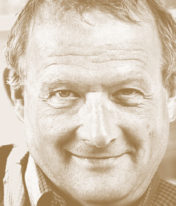Acceptance Speech
Your Majesty, ladies and gentlemen,
It is a great honour for me to be here, the recipient of the Erasmus prize. I am convinced that this award is an expression of respect for the dissident movement, of which I had the privilege of being a part. Among my predecessors I find names such as Leszek Kolakowski, my teacher, and Václav Havel, currently President of the Czech Republic, who has been my friend for 25 years – however, in the past a criminal and a prisoner, as we all were. I believe that I need to add to this list the name of a great Russian, that of Andrey Sacharov. He was the first among the just and the first to challenge the Communist dictatorship.
What was the essence of the dissidents’ attitude? I believe it was their courage in the face of dictatorship, and the reconciliation they sought after the victory. I believe that I also owe this great award to my friends from the dissident movement, such as Jacek Kurón, Bronislaw Geremek and others; but also my current friends, my friends at Gazeta Wyborcza, the most important newspaper in Poland which is led by the men from the resistance, by the former prisoners – the newspaper of freedom and tolerance, the newspaper that is palpable proof that we can work in the media in a modern democracy successfully without corruption and without being forced to conform. I also believe that this great honour is a sign of respect for the democracy of Poland, for my democratic fatherland, my fatherland that now, after decades of dictatorship, is free and democratic. It is a signal and is proof that Poland is indeed an essential part of European civilization, a sign of hope that we will soon be part of the European Union.
You know perhaps that the Netherlands has often functioned mythically for the most important personalities of Polish culture – for Leszek Kolakowski for example, who wrote on the work of Spinoza, on Dutch mysticism and on the second wave of Reformation; for Zbigniew Herbert, the author of great works on Dutch painting. But in the first place for the great Polish sociologist Stanislaw Osowski, who after the Second World War wrote a short essay before the greater wave of dictatorship and terror occurred. He wrote for his countrymen that you provide a good example for Poland: the Dutch democracy. The Netherlands, a country that has few mineral resources, no gold and not much coal or oil, has two characteristics that are very important for Poland. First of all, the republican monarchy, truly a singular phenomenon. As for myself, I was my whole life long a Jacobin, republican and revolutionary, but now I am jealous that we in Poland do not know a monarchy along the Dutch model – it is just like Erasmus, that prince of the republic of letters, the godfather of European intellectuals, not a man of dispute but of dialogue.
Finally, I am very pleased that I have been distinguished together with my friend Claudio Magris, the great Italian writer. An author who is particularly important for us of Central Europe, because Donau, Claudio’s book, was a Bible for us. It means that you – Czechs, Romanians and Hungarians – are necessary for us, for modern Europe. Claudio breathed new life into the more universal ambitions in Central Europe during the time of the dictatorship.
I believe that this ceremony offers a nice epilogue for Claudio’s book. The Donau has finally reached Amsterdam. It is just as in a bad American film: we finish with a happy ending.
Thank you very much.
